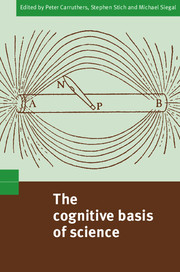Book contents
- Frontmatter
- Contents
- List of contributors
- Preface
- 1 Introduction: what makes science possible?
- Part one Science and innateness
- 2 Human evolution and the cognitive basis of science
- 3 Modular and cultural factors in biological understanding: an experimental approach to the cognitive basis of science
- 4 The roots of scientific reasoning: infancy, modularity and the art of tracking
- Part two Science and cognition
- Part three Science and motivation
- Part four Science and the social
- References
- Author index
- Subject index
3 - Modular and cultural factors in biological understanding: an experimental approach to the cognitive basis of science
Published online by Cambridge University Press: 23 November 2009
- Frontmatter
- Contents
- List of contributors
- Preface
- 1 Introduction: what makes science possible?
- Part one Science and innateness
- 2 Human evolution and the cognitive basis of science
- 3 Modular and cultural factors in biological understanding: an experimental approach to the cognitive basis of science
- 4 The roots of scientific reasoning: infancy, modularity and the art of tracking
- Part two Science and cognition
- Part three Science and motivation
- Part four Science and the social
- References
- Author index
- Subject index
Summary
The experience that shaped the course of evolution offers no hint of the problems to be faced in the sciences, and the ability to solve these problems could hardly have been a factor in evolution.
– Noam Chomsky, Language and Problems of Knowledge, 1988, p. 158This chapter explores the universal cognitive bases of biological taxonomy and taxonomic inference using cross-cultural experimental work with urbanized Americans and forest-dwelling Maya Indians. The claim is that there is a universal, essentialist appreciation of generic species as the causal foundation for the taxonomic arrangement of biodiversity, and for inference about the distribution of causally related properties that underlie biodiversity. Generic species reflect characteristics of both the scientific genus and species. A principled distinction between genus and species is not pertinent to knowledge of local environments, nor to the history of science until after the Renaissance. Universal folk-biological taxonomy is domain-specific; that is, its structure does not spontaneously or invariably arise in other cognitive domains, such as the domains of substances, artefacts or persons. It is plausibly an innately determined evolutionary adaptation to relevant and recurrent aspects of ancestral hominid environments, such as the need to recognize, locate, react to and profit from many ambient species. Folk biology also plays a special role in cultural evolution in general, and particularly in the development of Western biological science.
Information
- Type
- Chapter
- Information
- The Cognitive Basis of Science , pp. 41 - 72Publisher: Cambridge University PressPrint publication year: 2002
Accessibility standard: Unknown
- 9
- Cited by
